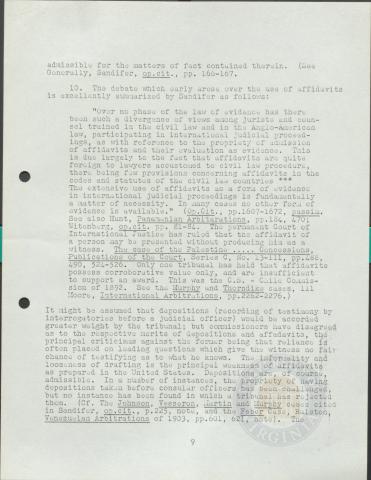
Page 9
| Parent | Perpetuation of testimony by Witnesses in U. S. for Presentation to International Military Tribunal |
|---|---|
| Date | 18 June 1945 |
| Language | English |
| Collection | Tavenner Papers & IMTFE Official Records |
| Box | Box 1 |
| Folder | General Reports and Memoranda from January 1946 |
| Repository | University of Virginia Law Library |
Generally, Sandifer, op.cit., pp. 166-167.
10. The debate which early arose over the use of affidavits is excellently summarized by Sandifer as follows:
"Over no phase of the law of evidence has there been such a divergence of views among jurists and coun¬sel trained in the civil law and in the Anglo-American law, participating in international judicial proceed¬ings, as with reference to the propriety of admission of affidavits and their evaluation as evidence. This is due largely to the fact that affidavits are quite foreign to lawyers accustomed to civil law procedure, there being few provisions concerning affidavits in the codes and statutes of the civil law countries *** The extensive use of affidavits as a form of evidence in international judicial proceedings is fundamentally a matter of necessity. In many cases no other form of evidence is available." (Op.Cit., pp.1607-1672, passim. See also Hunt, Panamanian Arbitarations, pp.184, 470; Witenberg, op.cit. pp. 31-84. The permanent Court of International Justice has ruled that the affidavit of a person may be presented without producing him as a
witness. The case of the Palestine Concessions,
Publications of the Court, Series C, No. 13-111, pp.488, 490, 524-526. Only one tribunal has held that affidavits possess corroborative value only, and are insufficient to support an award. This was the C.S. - Chile Commis¬sion of 1892. See the Murphy and Thorndike cases, 111 Moore, International Arbitrations, pp.2262-2276.)
It might be assumed that depositions (recording of testimony by interrogatories before a judicial officer) would be accorded greater weight by the tribunal; but commissioners have disagreed as to the respective merits of depositions and affadavits, the principal criticisms against the former being that reliance is often placed on leading questions which give the witness 210 fair chance of testifying as to what he knows. The informality and looseness of drafting is the principal weakness of affidavits as prepared in the United States. Depositions are, of course, admissible. In a number of instances, the propriety of having depositions taken before consular officers has been challenged, but no instance has been found in which a tribunal has rejected them. (Cf. The Johnson, Vesseron, Martin and Murphy cases cited in Sandifer, op.cit., p.225, note, and the Faber Case, Ralston, Venezuelan Arbitrations of 1903, pp.601, 621, note). The
